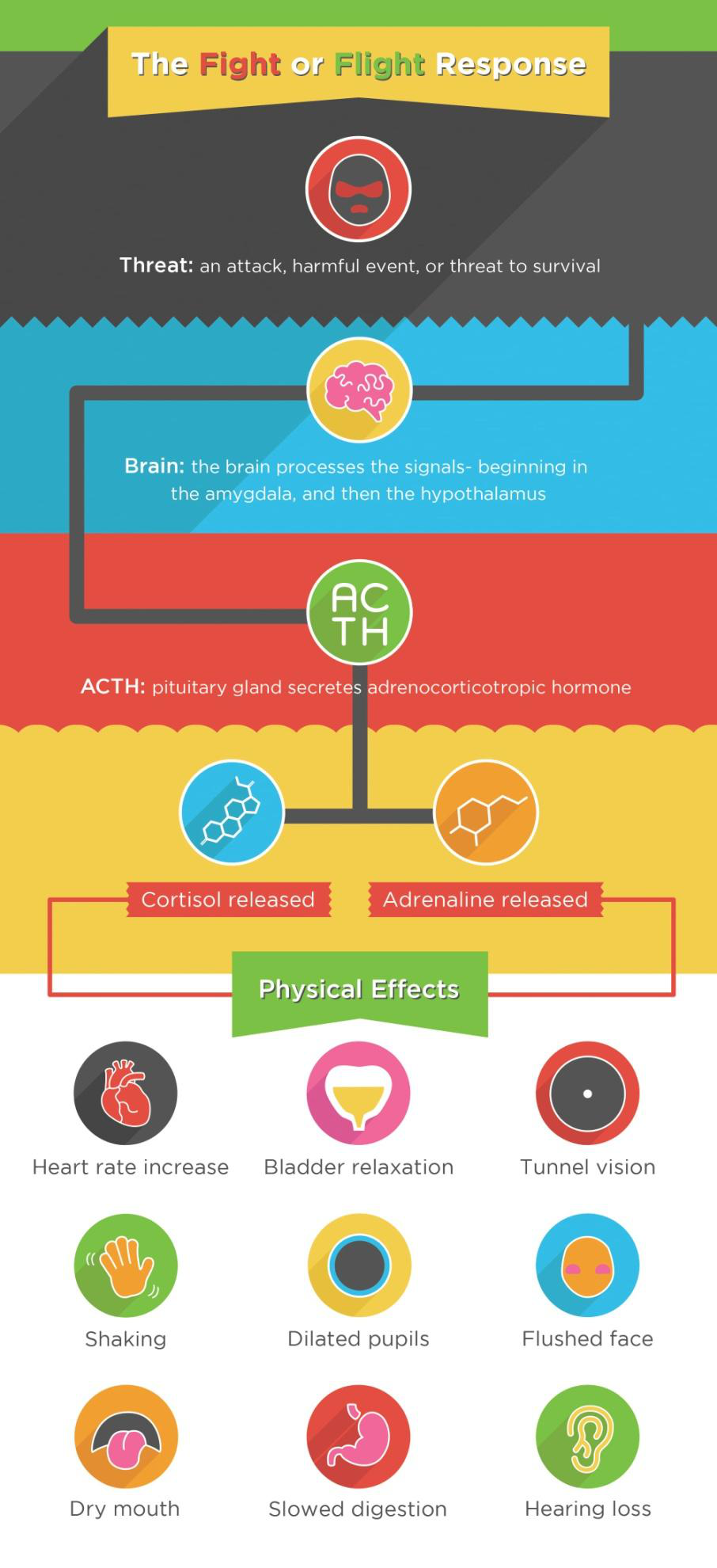Fight-or-Flight | Understanding Your Stress Response

Stress is a very common response to troublesome situations. When stress becomes too much it can manifest itself as mental and physical illnesses. Not being able to manage stress can cause mental and emotional exhaustion, irritability, and sleep disorders.
The stress response is the reaction of our body to a stressful situation. This response is there to keep us safe in case of distress. When the stress response is triggered, our body releases substances such as adrenaline and cortisol. Different organs in our body react to certain stressors in different ways.
The physical response to stress can be:
- Muscle aches
- Increased heart rate
- Dizziness
- Headaches
- Cramps
- Nausea and vomiting
- Trembling
Emotional responses to stress can be:
- Feeling restless
- Feeling hopeless
- Depression
- Anger
- Nightmares
- Mood swings
- Ruminating thoughts
- Lack of motivation
Behavioral responses to stress can be:
- Increase in smoking
- Avoidance
- Eating too much or not eating enough
- Sleeping too much or not sleeping enough
- Fidgeting
- Aggression
- Withdrawal
- Increase in alcohol consumption
- Poor hygiene
Stages Of Stress
There are three stages of stress:
- Alarm– At this stage, the fight-or-flight response is activated. Our body releases cortisol (the stress hormone), increases adrenaline and prepares us to either flee or fight.
- Resistance – After the initial response, our body starts to repair itself as our heart rate and energy returns to the normal state.
- Exhaustion– A person enters this stage when they feel chronic stress. At this stage, our mind and body are too drained to fight stress. This can lead to burnout, fatigue, depression, and anxiety.
Fight Or Flight

Image source: Wikipedia
Fight or flight response is the physiological reaction that occurs during a stressful situation whether it be mentally or physically. This response is triggered by the release of stress hormones. This response works as a survival instinct as it tells us to either flee from a situation or fight to survive.
When this response is active, our heart rate increases, our senses sharpen, and adrenaline is released.
During this response, our body goes through many physiological changes such as:
- Increased heart rate
- Increased breathing
- Pupils dilate and eyesight sharpens
- Goosebumps appear on the skin
- Increased sweating
- Reduced perception of pain
It might take 20-30 minutes for the body to return to a normal state.
Why Fight-or-Flight?
This response plays an important role in understanding how we deal with various stressors around us. When our body triggers the fight or flight response, it helps us to perform better in situations where we are pressured to perform well.
In the case of physical threats, this response may just actually save our lives. For instance, a person who has a fear of heights or acrophobia might experience fight or flight if they are asked to go to the top floor of a highrise. Their body will experience the alarm stage and it might lead to a panic attack as well.
Understanding your body’s stress response is important to cope with stressful situations before it turns harmful.
This response is common in people with:
- Trauma
- PTSD (post-traumatic stress disorder)
- Assault
- Anxiety disorders
- Phobias
Coping Techniques For Stress
1. Relaxation Techniques

Engaging in activities that promote relaxation can help you cope with the stress response. Techniques such as:
- Deep breathing
- Repeating a calm mantra
- Visualizing your happy place
- Meditation
- Yoga
- Tai chi
2. Physical Exercises

Regular physical activity can help you reduce stress response by:
- Reducing stress hormones
- Increasing endorphins
- Promoting calm
- Improving sleep
This can help you cope better in stressful situations.
If you are:
- Always “on edge”
- Constantly worried or nervous
- Constantly face fear even in non-threatening situations
- Are unable to relax
- In a constant state of fight-of-flight
It is recommended that you consult a mental healthcare provider.
Final Words
Our body’s fight or flight response is a stress response to fears and stressors. It acts as a defense mechanism to our body and mind. This response helps us to protect ourselves from a conscious threat.
People with a history of trauma and anxiety might react to certain situations in this way. If you are unable to let go of your worries, consult a professional mental health therapist to develop the best coping strategies for you and your situation. Consult Here
Disclaimer: As BetterHelp Affiliate, We may receive compensation from BetterHelp or other sources if you purchase products or services through the links provided on this page.
“Correctly identifying a negative emotion takes the brain out of fight-or-flight mode and into problem-solving mode, out of tension, anger, and confusion and into ease, calm and clarity.” – Sam Owen




















